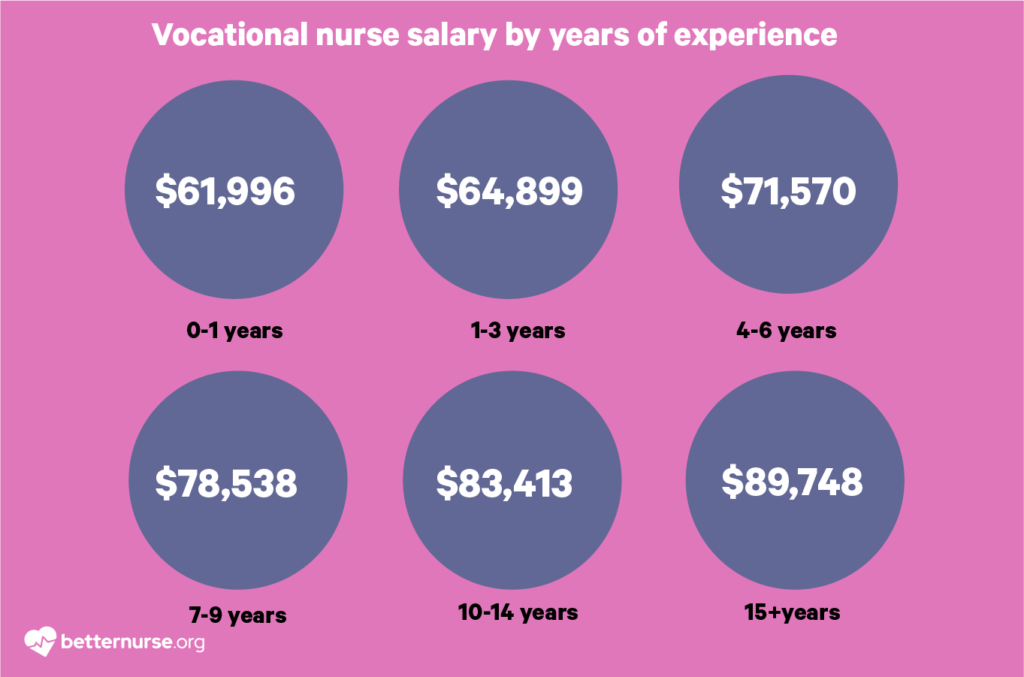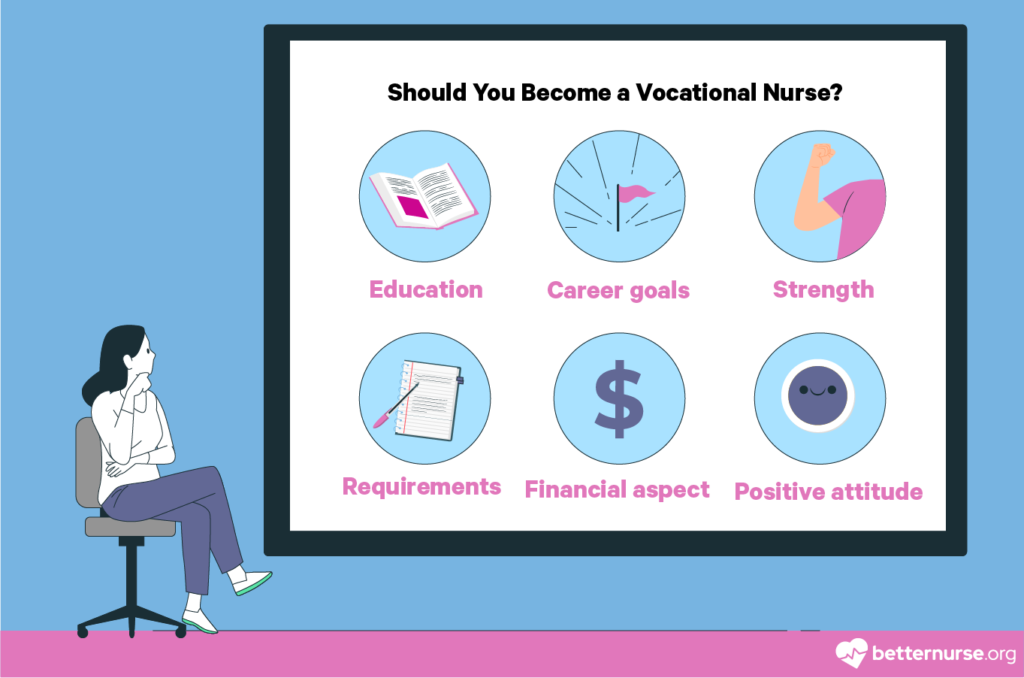Vocational nursing is critical to the healthcare industry, providing essential patient care and support. If you’re considering a career in vocational nursing, you may be curious about the salary and benefits that come with the job.
This comprehensive guide will provide you with all the information you need to know about vocational nurse salaries, including average earnings, benefits, and job outlook. Whether you’re just starting your career or are looking to advance in the field, learning about these important factors can help you make informed decisions about your future.
Table of contents
What Is a Vocational Nurse?
A vocational nurse, also known as a licensed vocational nurse (LVN), is a healthcare professional who provides primary nursing care under the administration of a registered nurse (RN) or physician. They work in various settings, including hospitals, clinics, long-term care facilities, and patients’ homes.
Vocational nurses perform a range of duties, such as taking vital signs, assisting with medications, dressing wounds, and helping with basic activities of daily living. In addition, vocational nurses may also collect samples for laboratory testing, document patient information, and communicate with healthcare professionals regarding patient care.
To become a vocational nurse, one must complete a state-approved vocational nursing program and pass the National Council Licensure Examination for Practical Nurses (NCLEX-PN). Vocational nursing is a profitable yet challenging career that requires compassion, critical thinking skills, and a commitment to providing high-quality patient care.
Vocational Nurse Salary & Job Outlook
Vocational nursing as a field offers competitive salaries and career growth potential. Licensed vocational nurses earn a median annual salary of $57,753 per year. However, nurses who pursue additional training and certifications may earn a higher income.
Additionally, according to the Bureau of Labor Statistics (BLS), the job outlook for licensed practical and licensed vocational nurses is steady, with a projected employment growth rate of 6% from 2021 to 2031.
Vocational nurse salary by state
The salary of a vocational nurse varies depending on the state they work in. To get an idea of the median wages in different states, refer to the map below. It displays the average salary for licensed vocational nurses in all 50 states.
Vocational nurse salary based on years of experience
According to recent data, a licensed vocational nurse’s annual salary can range from $61,996 to $89,748 based on experience. See the chart below for more details:

How To Increase Your Salary as a Vocational Nurse
If you’re a vocational nurse looking to increase your salary, there are several steps you can take to achieve this goal. First and foremost, gaining additional experience and skills can help you become a more valuable employee, leading to salary increases.
Consider pursuing advanced certifications or specializations in gerontology, pediatrics, or critical care to increase your knowledge and expertise in a specific area. In addition, seeking out opportunities for professional development, such as attending conferences or workshops, can also enhance your skills and make you a more desirable candidate for higher-paying positions.
Networking and building relationships with healthcare professionals can also help increase your salary. Building a strong professional reputation through positive patient outcomes and effective communication with colleagues can also lead to promotions or higher-paying positions.
Finally, consider seeking employment with a larger healthcare organization or hospital system, which may offer higher salaries and more opportunities for career advancement. Researching salary data and negotiating for a higher salary during hiring can also effectively boost your earnings.
By taking these steps and actively seeking opportunities for growth and development, you can increase your salary as a vocational nurse and advance your career in the healthcare industry.
Should You Become a Vocational Nurse?

If you’re considering a career as a vocational nurse, it’s essential to evaluate whether this path is right for you. Some key factors to consider include your interests, strengths, career goals, and the educational and licensing requirements for vocational nursing.
Becoming a vocational nurse requires completing a state-approved vocational nursing program and passing the NCLEX-PN exam. It’s important to ensure that you are willing and able to commit to the time and financial investment needed to complete these requirements.
Regarding personal qualities, successful vocational nurses are typically compassionate and patient and have strong communication and critical thinking skills. Additionally, vocational nursing can be a physically and emotionally demanding job, so it’s essential to have the ability to handle stress and maintain a positive attitude in challenging situations.
However, for those passionate about helping others and providing critical healthcare services, vocational nursing can provide a stable and in-demand career path with the potential to make a positive impact.
Benefits of being a vocational nurse
There are many benefits to working as a vocational nurse. You can provide essential care and support to patients facing various health challenges. This can help foster a feeling of purpose and fulfillment in your work.
Another benefit of working as a vocational nurse is the potential for career growth and advancement. With additional education and experience, you may be able to move into higher-level nursing roles or specialize in a specific area of healthcare. This can lead to increased earning potential, greater job satisfaction, and a sense of accomplishment.
Vocational nursing also offers flexibility in terms of work hours and schedules. Many vocational nurses work part-time or on a flexible schedule, which can benefit those with other commitments such as family or education. Additionally, vocational nursing is a stable and in-demand career path, with job opportunities available in various healthcare settings.
What’s the Bottom Line?
Vocational nursing can be a financially stable career path for those interested in the healthcare industry. In addition to the benefits of job security and growth, vocational nursing also offers flexible scheduling, benefits, and the chance to make a positive impact on the lives of others.
With careful consideration and dedication to professional development, you can achieve a successful career as a vocational nurse. So, take action today, and start exploring the possibilities of a career in vocational nursing.
Vocational Nurse FAQs
Where do vocational nurses get paid the most?
As of March 2023, Washington, New York, and Idaho are topping the list of the highest-paying states for licensed vocational nurses. As an LVN in Washington, you can expect to earn an average salary of $66,484 annually.
How much does LVN school cost?
The cost of LVN schools can vary depending on several factors, such as the location, type of institution, and program duration. Generally, LVN programs can cost anywhere from a few thousand dollars to over $30,000.
Community colleges, vocational schools, and technical schools often offer LVN programs at a lower cost than private institutions. The length of the program can also affect the cost, with shorter programs typically costing less than longer ones.
It’s important to note that in addition to tuition fees, there may be other costs associated with attending an LVN program, such as textbooks, supplies, uniforms, and clinical fees.
Researching and comparing the costs of different LVN programs in your area is recommended to find one that fits your budget and educational goals. Additionally, financial aid options, such as scholarships, grants, and loans, may be available to help cover the cost of tuition and other expenses.
How long does it take to become a licensed vocational nurse?
The time it takes to become a licensed vocational nurse can vary depending on several factors, such as the program’s structure, the student’s schedule, and their ability to complete the required coursework and clinical hours.
LVN programs usually take around 12 to 24 months to complete. These programs can be found at vocational schools, community colleges, and some hospitals. After completing the program, the student must pass the National Council Licensure Examination for Practical Nurses (NCLEX-PN) to become a licensed vocational nurse.
Overall, the entire process of becoming a licensed vocational nurse usually takes around 1-3 years.

Nurse Luke is a CRNA who specializes in Nursing content and still enjoys a very busy career with Locum, Per Diem and Travel nursing in the greater midwest. He has over 25 years of experience in the healthcare field and received his CRNA masters degree from the Mayo Clinic School of Healthcare. He is passionate about helping nurses explore the options of becoming a travel nurse as well as spending time with his Family.



